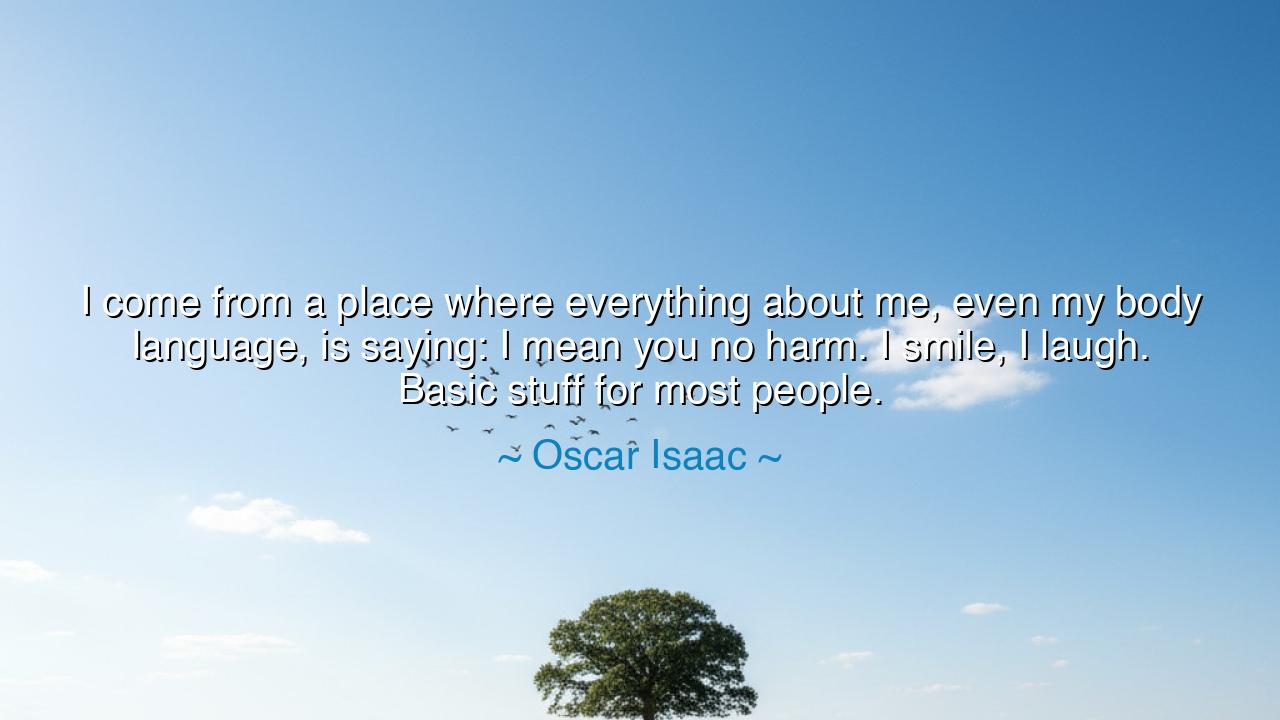
I come from a place where everything about me, even my body
I come from a place where everything about me, even my body language, is saying: I mean you no harm. I smile, I laugh. Basic stuff for most people.






The words of Oscar Isaac, spoken with humility yet carrying the weight of hidden struggle, reach us like an ancient parable: “I come from a place where everything about me, even my body language, is saying: I mean you no harm. I smile, I laugh. Basic stuff for most people.” What he utters is no idle phrase, but the unveiling of a reality known by many and confessed by few—that some are born into worlds where survival demands gentleness, where safety is purchased not with might but with the careful art of disarming others through kindness.
To say, “I mean you no harm,” is to reveal a history of suspicion and peril, where one must prove harmlessness before trust is given. For many, a smile or a laugh is simply an outpouring of joy; but for those raised in harsher lands or in the shadows of prejudice, such gestures become armor, signals meant to shield against danger. Isaac speaks, then, for all who have been compelled to shape even their body language into a plea for peace, into a living assurance that they bring no threat. This is the heritage of the vulnerable: to learn early how to soothe the fears of the powerful.
The ancients, too, knew this truth. In the great courts of kings, envoys from foreign nations would approach with open hands, lowered weapons, and smiles carefully arranged, lest they be struck down as spies or foes. Think of the Greek statesman Themistocles, who, after being exiled, sought refuge with the Persian king. Though he was once an enemy of Persia, he survived not by sword but by gestures of humility, by making his very presence radiate harmlessness. In this way, he lived when others would have perished, for his body language spoke what words could not.
Yet Isaac’s words carry not only sorrow but also triumph. For though he learned to smile and laugh as a safeguard, these gestures are not falsehoods but bridges. What begins as protection becomes connection. A laugh shared can dissolve suspicion; a smile can cross the chasm of language and culture. What he calls “basic stuff” is, in truth, the deepest of human tools—the unspoken language by which strangers are knit together, by which enemies may be turned toward peace.
The wisdom here is double-edged. On one side, it teaches compassion: many who laugh and smile are not merely cheerful, but survivors, their joy a cloak for the pain of their past. On the other side, it teaches responsibility: we must strive to create a world where no one feels compelled to prove their innocence simply by softening themselves. True peace does not demand constant reassurance; it grants freedom for a man or woman to walk with dignity, without fear.
Consider how this truth lives in our own age. There are children in every nation who learn to laugh quickly to appease anger, who bow their heads to appear small, who stretch a smile across their faces to say, “I mean no harm.” Let us not scorn them, but honor the resilience they embody. Yet let us also labor for a day when their body language need not plead for safety, when their smile may be pure joy rather than shield.
The lesson, therefore, is this: practice awareness and mercy. When you see one who smiles easily, do not take it only as lightheartedness—see also the possibility of hidden burdens. When you meet another, let your own presence say without words: “You are safe with me.” Carry yourself not with arrogance or suspicion, but with openness, that others may breathe freely in your company.
Thus, from the lips of Oscar Isaac comes a wisdom as old as humanity itself: that a smile can protect, a laugh can heal, and body language can speak louder than speech. But the greater calling is this—that we create spaces where such defenses are no longer needed, where trust is not begged for but freely given, and where all may live without fear, carrying themselves not as the threatened but as the free.






AAdministratorAdministrator
Welcome, honored guests. Please leave a comment, we will respond soon